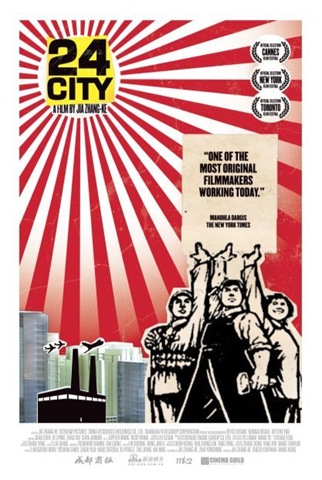
24 CITY
China, 2008, 107 minutes, Colour.
Directed by Jia Zhang Ke.
A serious and seriously-paced Chinese documentary on the transition of a large armaments factory to new premises, the demolition of the old building and the reminiscences of managers and workers and people associated with the factory over the years. The three generations of women presented are not actual characters but actresses performing. The site is to be used for re-development and a 5 star hotel, 24 City. The location is the Chinese city of Chengdu.
No Michael Moore histrionics or intrusions here. No Morgan Spurlock expose, humour or banter here. The series of interviews, quite long and detailed, of men and women are beautifully mounted and framed. There are momentary inserts of action, like scenes of smelting or a young girl roller-skating. But, it is mainly listening attentively to the talking heads.
The factory was part of state secret activity, especially for armaments and repairs to planes from the time of the Korean War. It continued to grow until the 70s and war with Vietnam. When arms needs fell (this comes as something of a surprise because China is still an arms supplier around the world), the factory changed to household goods like fridges and washing machines but it still wanted (and wants) to maintain its standards in aeronautics. Workers born in the 1930s, 1940s and 1950s bring their working era to life though their memories.
What is revealed is something of the history of Communist China from the 1950s and its adoption of socialism, the cultural revolution and more recent changes that have absorbed a great deal of capitalist ethos. This is especially true of the final (fictional but very real) interviewee who was born in 1982, is a fashion buyer in Hong Kong for the rich women of the city and hopes to manage a revolving restaurant at the top of a Chengdu tower.
Director Jia Zhang Ke has a reputation for documentaries and won the Venice Golden Lion for his fiction feature on the building of the Three Gorges Dam, Still Life.
1.The director and his documentary work? Features? The combination of documentary and performed interviews here? The acclaim for his work?
2.His style: location photography, the city of Cheng Du, the overviews of the city, the factory, the work of demolishing and moving out, the model of the new city?
3.The film built on interviews, the different settings and framings for the interviews, the long interviews and the audience reliance on words and intonations?
4.The interviews punctuated by interludes: the hospital visit, the furnace work at the factory, the roller-skating girl, the demolition scenes? The musical score?
5.The history of the factory, the security for the government, for the Korean War, for arms manufacture, for the war against Vietnam, through the cultural revolution, change, updating in the 90s, the move to domestic products? Yet the emphasis on aeronautics?
6.The new city, the apartments, the five-star hotel, Chinese prosperity?
7.The range of eras explored, the different personalities of the interviewees, officials, workers, managers? Those born in the 30s, 40s and 50s? The different attitudes of those born later?
8.The focus on the different eras and the history of China and industry:
1953-57, the five-year plan, the optimism of Mao Tse Tung’s era? The ambitions for China? State-owned control?
1958-60, “The great leap forward”, development, the post-Korean War era? The false reports, the conformism?
1966-76, the cultural revolution, industrialisation being interrupted, political movements, repression, the dropping of productivity? A step back?
1978, planned economy, to market economy, the central committee, open-door policy, interest in the outer world?
1980s-1990s, the reform of the system, the reform of industry, management, ownership, greater industrialisation, openness to the world?
1995-2000, the changes in industry, lay-off, unemployment? Pensions?
1998, the state-owned enterprise reform, management, productivity – and China becoming a 21st century industrial and economic power?
9.The men and women, the actresses and their talent in bringing to life the women of the different eras, the woman from the 1970s, likened to Joan Chen in the film, The Little Flower (and the actress, Joan Chen, performing this interview)? The women in later decades, hardworking, wanting a profession? Coping with change? The young woman, her ambitions, working for fashions for the rich women of Cheng Du, hoping to work as a manager of the revolving restaurant? The history of the period as illustrated by the interviews with these three women?
10.The cumulative effect of the images, of the interviews, of seeing the building demolished – to a women’s choir singing The Internationale? The building disappearing in the dust?
11.Optimism for the future of China?